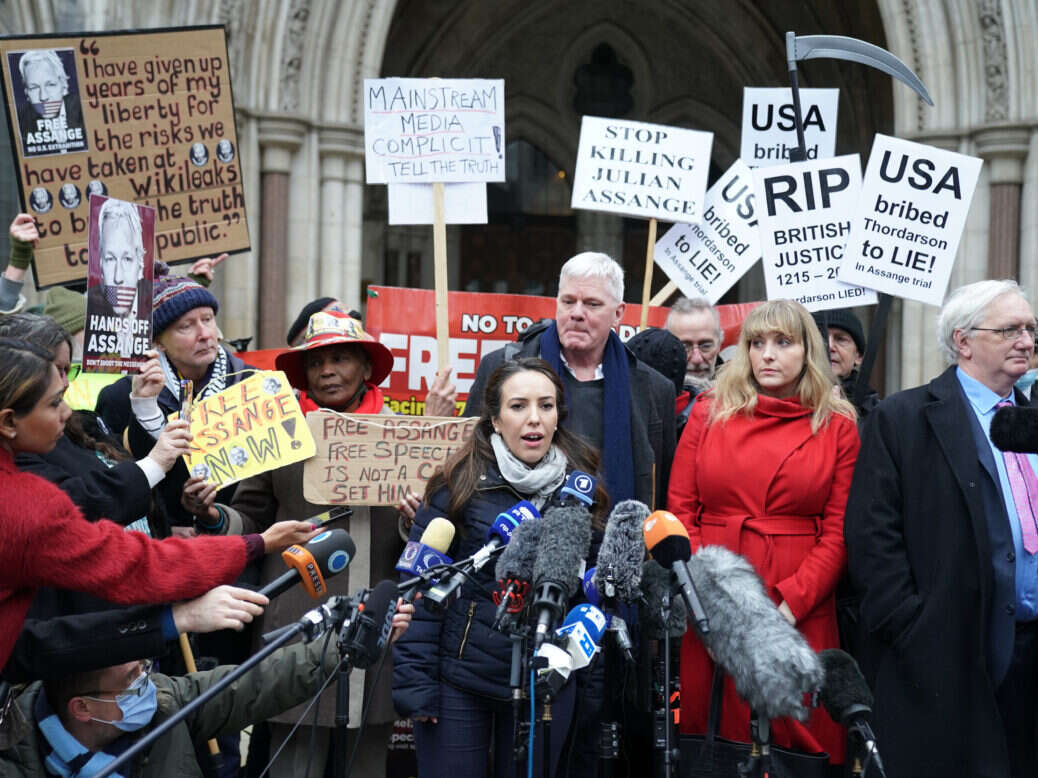
Wikileaks founder Julian Assange has won the first stage of his bid to appeal against the decision to extradite him to the United States.
Assange has been granted permission to appeal to the Supreme Court against December’s decision.
For a proposed appeal to be considered by the UK’s highest court, a case has to raise a point of law of “general public importance”.
On Monday, two senior judges at London’s High Court ruled there was a point of law, but denied him permission for the appeal.
However, Lord Chief Justice Lord Burnett, sitting with Lord Justice Holroyde, said Assange could go to the Supreme Court itself and ask to bring the appeal to “certify a point of law”.
“Whether or not the issue needs ventilation in that court is a matter appropriately for its decision,” Lord Burnett said.
The point of law is: “In what circumstances can an appellate court receive assurances from a requesting state which were not before the court of first instance in extradition proceedings”.
The judges added that “although the law in this jurisdiction has long been settled it does not appear that the Supreme Court has considered the question.
“Assurances are at the heart of many extradition proceedings”.
Overturning the block on the extradition in December, the senior judges found that the judge who originally blocked the extradition had based her decision on the risk of Assange being held in highly restrictive prison conditions if extradited.
However, the US authorities later gave assurances that Assange would not face those strictest measures either pre-trial or post-conviction unless he committed an act in the future that required them.
Lord Burnett previously said that if the original judge had been given those assurances at the time of her ruling, “she would have answered the relevant question differently”.
Lord Burnett asked the court to “take steps to expedite consideration of any application” that follows. Assange’s lawyers now have 14 days to make the application to the Supreme Court.
In a statement after the ruling, Julian Assange’s fiancee Stella Moris said: “What happened in court today is precisely what we wanted to happen.
“The High Court certified that we had raised a point of law of general public importance and that the Supreme Court has good grounds to hear this appeal. The situation now is that the Supreme Court has to decide whether it will hear the appeal but make no mistake, we won today in court.
“But let’s not forget that every time we win, as long as this case isn’t dropped, as long as Julian isn’t freed, Julian continues to suffer.
“For almost three years he has been in Belmarsh prison and he is suffering profoundly, day after day, week after week, year after year. Julian has to be freed and we hope that this will soon end.
“But we are far from achieving justice in this case because Julian has been incarcerated for so long and he should not have spent a single day in prison. If there had been justice, the officials who plotted, who conspired to murder Julian, would be in the courtroom right now.”
She added: “Our fight goes on and we will fight this until Julian is free.”
Assange, 50, is wanted in the US over an alleged conspiracy to obtain and disclose national defence information following Wikileaks’ publication of hundreds of thousands of leaked documents relating to the Afghanistan and Iraq wars.
In December last year, US authorities won their High Court challenge to overturn an earlier ruling that Assange should not be extradited due to a real and “oppressive” risk of suicide.
Birnberg Peirce Solicitors, for Assange, previously said the case raised “serious and important” legal issues, including over a “reliance” on assurances given by the US about the prison conditions he would face if extradited.
Agnieszka Biel, extradition lawyer at Gherson Solicitors, said: “In recent years the English courts have considered a number of extradition requests to countries in which individuals could face a real risk of torture and other ill-treatment, in breach of their Article 3 ECHR rights.
“The case of Assange raises an important legal issue over a reliance on assurances provided by foreign governments about the prison conditions in their respective countries, and whether such assurances are sufficient to reduce or even eliminate the risk of abuse.”
In her January 2021 ruling blocking the extradition, then-district judge Vanessa Baraitser found in favour of the US on all issues except Assange’s mental health.
Assange has previously indicated that he wants to challenge the original judge’s other findings at a later date.
National Union of Journalists general secretary Michelle Stanistreet said on Monday that although the latest decision is welcome, “this case is damaging media freedom every day that it drags on.
“The US is seeking Assange on charges that relate to the very business of gathering and processing news. For so long as this is treated as a potentially indictable offense, reporters, doing important work, will be looking over their shoulders.”
Picture: PA Wire/Kirsty O’Connor
Email pged@pressgazette.co.uk to point out mistakes, provide story tips or send in a letter for publication on our "Letters Page" blog
